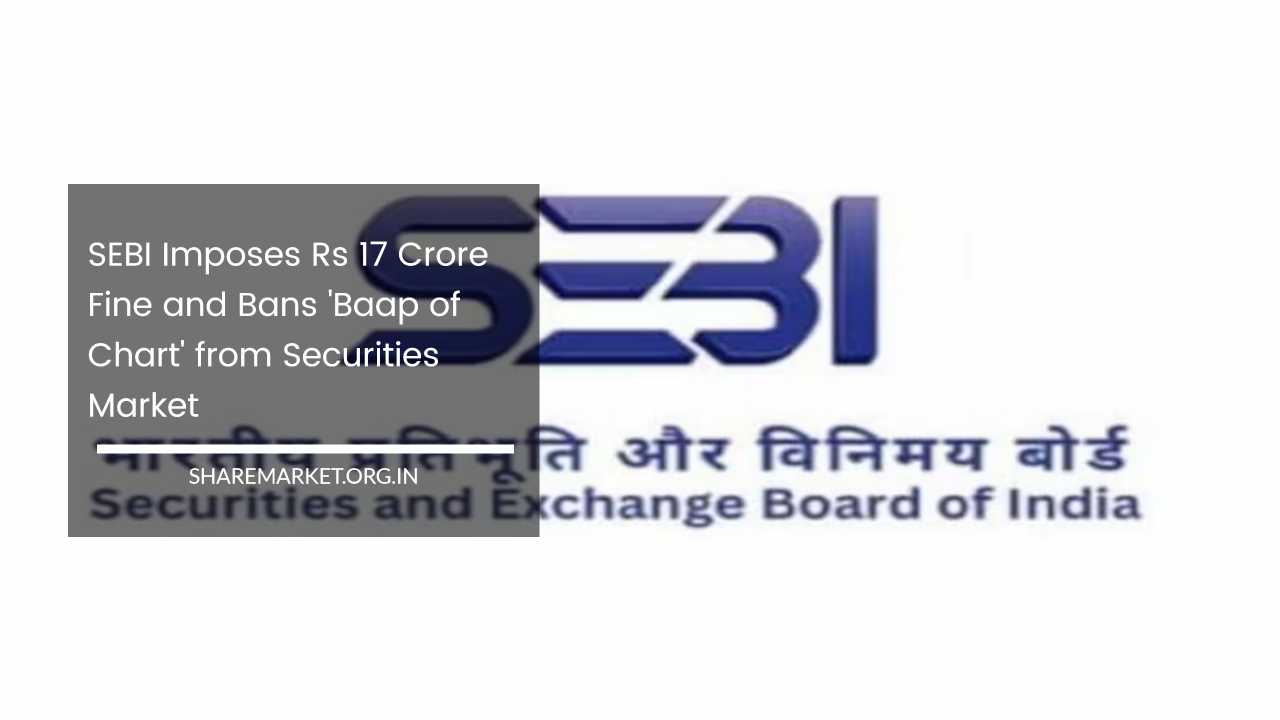SEBI Imposes Rs 17 Crore Fine and Bans ‘Baap of Chart’ from Securities Market

SEBI
Market regulator SEBI (Securities and Exchange Board of India) has made a significant move by taking action against Mohammad Naseeruddin Ansari, a popular financial influencer known for his YouTube channel ‘Bap of Charts.’ SEBI’s recent actions have garnered attention due to the allegations against Ansari and the broader implications for the financial influencer industry in India.
In this discussion, we will delve deeper into the details of the case and explore the context in which this action has been taken.
Allegations Against Naseeruddin Ansari:
The crux of SEBI’s action against Ansari revolves around allegations of misleading practices, unethical financial advice, and misrepresentation of trading performance.
- Providing Trading Recommendations Under False Pretenses:One of the central allegations against Ansari is that he provided trading recommendations to his followers under the guise of educational courses for which he charged fees. This practice is not uncommon in the financial influencer space, where individuals leverage their online presence and knowledge to offer paid courses and advice. However, the crux of the issue here is the claim that Ansari was enticing customers and investors to purchase his courses and workshops through misleading or false information.
- Misrepresentation of Trading Performance:Another serious allegation is the misrepresentation of Ansari’s trading performance. According to SEBI’s investigation, Ansari claimed to have achieved impressive results, including profits of 20-30% and a 95% accuracy rate. However, the actual investigation found that Ansari had incurred a net trading loss of Rs 2.89 crore during the period from January 2021 to July 2023, directly contradicting his claims.
‘Bap of Charts’ and Its Reach:
‘Bap of Charts’ is a YouTube channel that boasts a substantial following. As of the latest available information, the channel has over 443,000 subscribers, making it a significant platform for financial advice and recommendations. Additionally, Ansari had approximately 83,000 followers on X (formerly Twitter), further expanding his reach.
The content on ‘Bap of Charts’ primarily revolves around trading recommendations and courses.
Financial influencers like Ansari have gained prominence by providing advice on buying and selling in the stock market, often using various technical and fundamental analysis methods to support their claims.
SEBI’s Efforts to Regulate Fininfluencers:
SEBI’s actions against Naseeruddin Ansari are part of a broader effort to regulate financial influencers, often referred to as ‘fininfluencers.’ The regulatory body has been concerned about the potential risks and issues associated with the growing influence and impact of individuals providing financial advice through social media and online platforms.
In August 2023, SEBI released a consultation paper that proposed new rules to restrict the engagement of regulated entities with SEBI-registered intermediaries or unregistered ‘fininfluencers.’
The purpose of this paper was to address concerns regarding the quality and reliability of financial advice provided by influencers and unregistered intermediaries. The paper also included measures aimed at “disrupting the earning model for such fininfluencers.”
One of the key points of the consultation paper was to invite input and suggestions from the public. This demonstrates SEBI’s commitment to gathering diverse perspectives and opinions in its pursuit of effective regulation in the rapidly evolving financial advisory landscape.
Implications and Significance:
The action taken by SEBI against Mohammad Naseeruddin Ansari has significant implications for both financial influencers and investors in India. Here are some of the key points to consider:
- Investor Protection:SEBI’s primary mandate is to protect the interests of investors. By taking action against influencers like Ansari who allegedly provide misleading or false financial advice, SEBI aims to ensure that investors are not lured into making unwise or uninformed decisions that could result in financial losses.
- Credibility and Accountability:The case underscores the need for financial influencers to be accountable for the advice they provide. It highlights the importance of maintaining credibility and integrity in the financial advisory industry. Investors rely on the expertise and guidance of these influencers, and it is crucial that they offer accurate and ethical advice.
- Regulatory Oversight:SEBI’s efforts to regulate fininfluencers are indicative of the growing recognition that this sector needs proper oversight. As the influence of social media and online platforms in financial decision-making continues to rise, regulators must adapt to protect investors and maintain market integrity.
- Consumer Education:The case also emphasizes the importance of consumer education. Investors should be cautious and conduct due diligence before relying on financial advice from influencers. It is essential to verify the credibility and track record of these influencers, and this incident serves as a reminder of that.
The Role of Financial Influencers:
Financial influencers have gained prominence in recent years as individuals who use social media, YouTube, and other online platforms to offer financial advice and insights.
They often leverage their knowledge and expertise to build a following of eager investors and traders seeking to improve their financial prospects.
While many of these influencers provide valuable and legitimate guidance, the ease with which one can establish an online presence has also opened the door to potential abuses and unethical practices.
Financial influencers play a critical role in disseminating information and providing education about financial markets and investment opportunities. They often cater to a wide audience, ranging from beginners looking to enter the world of stock trading to experienced investors seeking additional insights.
However, the case of Naseeruddin Ansari highlights that not all influencers operate with the same level of transparency, integrity, and professionalism.
The Importance of Transparency and Accountability:
In the financial advisory industry, transparency and accountability are paramount. Investors place their trust in those who provide financial advice and expect that the information and recommendations they receive are accurate and ethical.
Misleading or false information can have severe consequences, including financial losses and damage to an investor’s financial well-being.
Regulators like SEBI are tasked with overseeing and maintaining the integrity of the financial markets. They work to protect investors and ensure that the information disseminated within the industry is credible and trustworthy.
Actions like the one taken against Naseeruddin Ansari are part of this broader mission to safeguard investors from potentially harmful practices.
Balancing Freedom of Speech and Investor Protection:
The regulation of financial influencers raises questions about the balance between freedom of speech and investor protection. While it is essential to protect the rights of individuals to express their views and opinions, it is equally crucial to protect investors from potentially misleading, false, or unethical practices.
Regulators face the challenge of crafting rules and guidelines that strike this balance effectively. The primary concern is to distinguish between legitimate financial education and advice and practices that harm investors.
The case against Ansari serves as a reminder that regulators must be proactive in addressing emerging issues in the financial advisory space.
Public Input and Regulatory Evolution:
One notable aspect of SEBI’s approach is its willingness to seek public input through consultation papers. By inviting suggestions and feedback from the public and industry stakeholders, regulators can gain valuable insights into the challenges and potential solutions in regulating fininfluencers.
Regulatory bodies worldwide are continually evolving to adapt to the changing landscape of financial services, which increasingly includes digital platforms and social media.
In this context, public input is invaluable for shaping effective regulations that consider diverse perspectives and account for the rapid growth of online financial advisory services.
Final Remarks:
The case of Mohammad Naseeruddin Ansari and the actions taken by SEBI represent a pivotal moment in the evolving landscape of financial influencers and online financial advisory services.
It underscores the critical role that regulators play in safeguarding the interests of investors and maintaining the integrity of financial markets.
Financial influencers have the potential to provide valuable education and insights to individuals seeking to navigate the complexities of the financial world.
However, the rise of influencers also presents new challenges, including the need for effective regulation to protect investors from unethical practices and misleading advice.
As the financial advisory industry continues to transform in response to technological advancements and changes in communication and information dissemination, regulators must adapt their strategies to ensure that investor protection remains a top priority.
Public input and open dialogue will play a vital role in shaping the future of financial influencer regulation, as the industry strives to strike the right balance between freedom of speech and investor protection.
Investors, on their part, should exercise caution and conduct thorough due diligence when seeking financial advice from influencers.
The case of Naseeruddin Ansari serves as a reminder that while there are credible and knowledgeable individuals providing financial guidance, not all influencers may have the best interests of investors at heart.
It is essential for investors to verify the credibility, track record, and integrity of those they rely on for financial advice, thus making informed decisions in their investment journey.

















